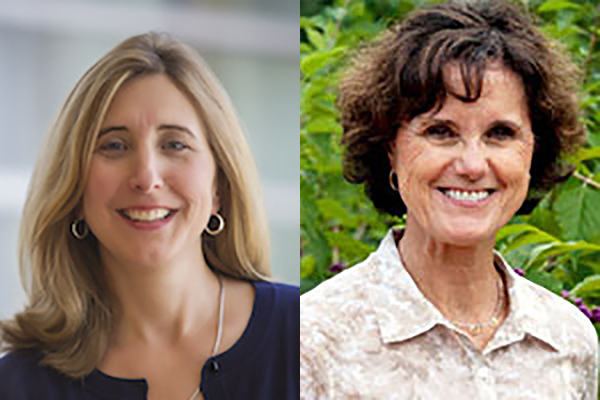UNC Lineberger members Deborah Tate, PhD, professor of nutrition and of health behavior, and Dianne Stanton Ward, EdD, professor of nutrition, both at the UNC Gillings School of Global Public Health, received awards for their contributions to obesity research at The Obesity Society’s annual meeting, held Oct. 31 – Nov. 4 in New Orleans.

Dianne Stanton Ward, EdD, professor of nutrition, and Deborah Tate, PhD, professor of nutrition and of health behavior, both members of UNC Lineberger who have appointments in the UNC Gillings School of Global Public Health, received awards for their contributions to obesity research at The Obesity Society’s annual meeting, held Oct. 31 – Nov. 4 in New Orleans.
The Obesity Society is the leading professional society dedicated to better understanding, preventing and treating obesity. The meeting, called “ObesityWeek,” is the leading educational and scientific conference with a focus on obesity prevention and treatment.
Tate was presented with the 2016 Pioneer Award for Excellence in the Field, awarded by The Society’s eHealth/mHealth Section for demonstrating excellence in advancing technologies, obesity research, prevention and treatment.
Ward received the 2016 Oded Bar-Or Award, which recognizes an individual selected by the Pediatric Obesity Section for contributions to pediatric obesity research and advances in the scientific understanding of etiology, prevention and treatment of obesity.
Penny Gordon-Larsen, PhD, professor of nutrition at the Gillings School and president of The Obesity Society, acknowledged the contributions of a number of advocates, researchers, legislators and emerging leaders.
“It’s not often that I’ve had the opportunity to recognize such an esteemed group of professionals, each of whom has contributed a great deal to the obesity field,” she said. “I am honored to be a part of TOS’s efforts to recognize these stellar scientists and policy makers who have made such a tremendous impact in a range of areas from basic science to clinical research to policy development.”
Tate has worked for two decades in behavioral weight management programs, particularly those delivered through web and mobile platforms. She conducted several of the first randomized online trials and new technologies to deliver behavioral treatments for obesity. Focusing on strategies both for short- and long-term weight loss, Tate has received National Institutes of Health funding since 2000 for her work in obesity and digital health intervention.
“I am lucky enough to work in a field that is exciting and rewarding — and to be working with such great people,” said Tate. “I am grateful to have been honored in this way by TOS.”
Ward, with more than 30 years’ experience in childhood obesity prevention and physical activity promotion, has served since 2002 as principal investigator for the Nutrition and Physical Activity Self-Assessment (NAP SACC) program, which works with early care and education programs to set preschool children on a lifelong path toward healthy eating and regular physical activity. She is a fellow at the UNC Center for Health Promotion and Disease Prevention.
Ward said, too, that she was fortunate to have found an area of research that had challenged and rewarded her for most of her career.
“The Obesity Society honor, named for my mentor, is truly gratifying and inspired me to work even harder to find ways to reduce pediatric obesity,” she said.
Elizabeth Mayer-Davis, PhD, Cary C. Boshamer Distinguished Professor of nutrition and medicine, and chair of the nutrition department at the Gillings School, noted that the two awards were presented by the premier professional society focusing on obesity and said she was extremely proud that Ward and Tate were members of the Gillings School faculty.
“Both of them have collaborated extensively here at UNC, and their work has contributed substantially to the field,” Mayer-Davis said. “It is important also to recognize that both have been very much engaged in training students and fellows. The impact of their work will be felt for many years to come.”
